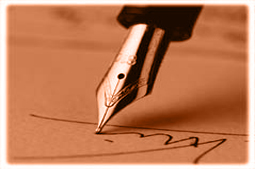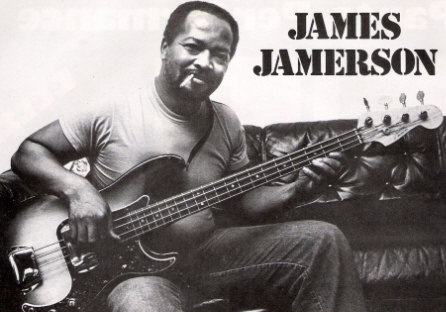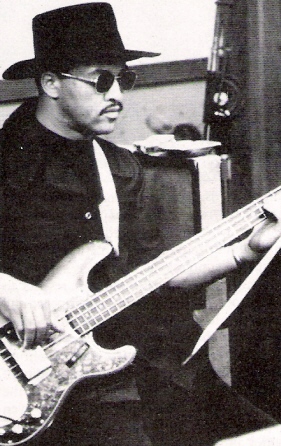"Bass players call from all over, wanting to know what type of equipment I use, what type of bass, what kind of strings-- things like that. I'll tell them, but that's not what's important; it's the feel. The strings don't make the sound, it's the feel. It's all in here, in the heart."
______________________________________________
Were your bass lines on those innumerable Motown hit records usually your own ideas?
Yes, they'd give you a chord sheet and say "You're on your own." I'd just get a paper with the chords written in pencil. They'd use the numbers [Roman numerals that denote chords, such as I, V, V, etc.], like the people down in Nashville use.
How did you first connect with Motown?
Well, I was playing upright bass in the late 50's, doing some sessions with other people at Berry Gordy's first wife's studio. Berry heard the lines I was playing and fell in love with them. He asked me if I'd be interested in coming over and being part of the company, and I told him yes.
Was upright bass your first musical instrument?
Yes, I took it up in high school, in 1954. I played sessions on upright until 1961.
Was the transition from upright to electric difficult?
No, it just took a little while to get the feel of the neck, because the neck is smaller, you know. It took me about two weeks [laughs]. I bought my first electric, a Fender Precision, in 1961 when I had to go on the road with [singer] Jackie Wilson. I played with Jackie almost a year.
Were your first influences on the bass mostly jazz players?
Right. Modern jazz players like Percy Heath, Ray Brown, and Paul Chambers. Back then I was working with cats like [pianist] Barry Harris and [flautist/oboist/saxophonist] Yusef Lateef. I played dances in high school in a jazz group--modern jazz with a little bebop mixed in. That was during the Ivy League days.
When you started playing on rock, and rock and soul dates, where did you get the non-jazz influences from?
That was automatic. But I had worked with blues players like John Lee Hooker and an old fella called Washboard Willie. Also, I was raised a Baptist, and I heard a lot of gospel music.
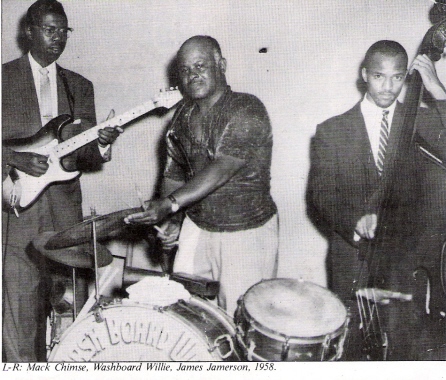
Did your formal training at Wayne State come in handy on any of the gigs?
Yes, because after I played a line, they'd have an arranger write it out. Then if I'd go on the road, I'd have to relearn and memorize the line, because I never played the same thing all the time.
Did you tour much with the Motown acts?
I toured till '64, then came off the road completely to be on the staff. I quit traveling with the Miracles in '63. Nobody at Motown would record anything until I came off the road.
Did you record for any other labels during that time?
I didn't do too many things for other labels. We were told we'd get fined if we moonlighted. It's illegal for a company to fine you for that, but I didn't know it then. I did do a few Chess things with some vocal groups. At that time we'd just do the rhythm track, and I never even heard the records.
Do a lot of bass players ask you for playing tips?
Bass players call from all over, wanting to know what type of equipment I use, what type of bass, what kind of strings-- things like that. I'll tell them, but that's not what's important; it's the feel. The strings don't make the sound, it's the feel. It's all in here, in the heart.
Do you still use a Precision?
Yes, none of the other basses get that sound. I just put LaBella heavy-gauge flatwounds on it; I think they're better than the Fender strings that come on the bass.
What kind of amplifier do you use?
I have an Ampeg B-15 for sessions-- I use it on gigs, too. On the road now I plug the B-15 direct into the PA.
How do you set the tone controls?
It depends on the producer and the session. Some people like the treble up; I like the bottom end, because that makes the record sound fuller. It gives a rounder tone, a fatter sound.
How many basses do you own?
Four. I have an old German upright, a Fender 5-string, a Hagstrom 8-string, and the Precision. I've had two Precisions stolen from me, but my present one I bought new in '63. When I got it I immediately took the Fender strings off and put LaBellas on, and I've had the same strings on it ever since. You don't need to change strings all the time; you'll lose the tone. It's like a new car: the older it gets, the better it rides.
Do you use any effects devices?
Not unless people ask for them. It's all in the fingers, man. I don't think a bass should sound in any way different than it's supposed to sound. It should sound like a bass.
Do you ever use your thumb for any slapping effects?
I'm not into that; my son's into that. I can get the sound without having to slap. It's in the way you pull the string. I just use my index finger.
Did you teach your son how to play?
Oh, I sat down with him and showed him things. He discovered some on his own and asked me if they were right or wrong.
What advice would you give to beginners?
Well, I think the first thing you should do is play upright bass. That would strengthen everything-- your wrist, your fingers, the joints of your fingers.
Do you still practice your upright?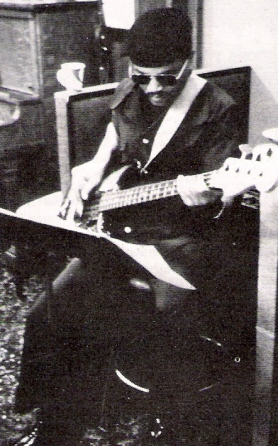
Well, I don't practice [laughs]. I just practice when I'm doing a gig or a session.
Do you prefer studio work to live gigs?
Since I've been in the studio such a long time, I need to get out sometimes. I like to get out and change the scene--especially if the price is right. It's easier; if you make a mistake you just keep going straight ahead.
What players do you listen to today?
Well I never have listened to too much. I just create my own thing. The stuff on the radio is somebody else--that's old. I try to come up with something different. What I'm hearing these days from other people has all been played. Most of the bass players don't play bass; they're just playing at it. They're not really saying anything. It's just a lot of gimmicks, and actually I don't think they know what they're doing. A lot of the younger guys who I like copied me. Most young guys try to copy Stanley Clarke or Larry Graham.
How often are you in the studios these days?
It varies; it's not like it used to be. I had to go into the studio every day at nine in the morning and come out at three the next morning.
Do you still create most of your own parts?
Sometimes; some leaders come into the session with the bass lines written out. They want it nice and simple now.
Do you still get a lot of calls asking for the "James Jamerson" sound?
Yes, the sound plus the name.
Do you think you get more dates because producers want your own distinctive sound, or because you're capable of handling whatever they ask you to play?
I don't know [laughs]. I think a little bit of both.
Do you think Motown's records started sounding different when the label moved from Detroit to Los Angeles?
Yeah, altogether different. They lost the sound, man. They moved to L.A. looking for something different, and they didn't find it. And all along everybody else was searching for the same sound they had.
back to top
Dan Forte - Guitar Player Magazine 1979
